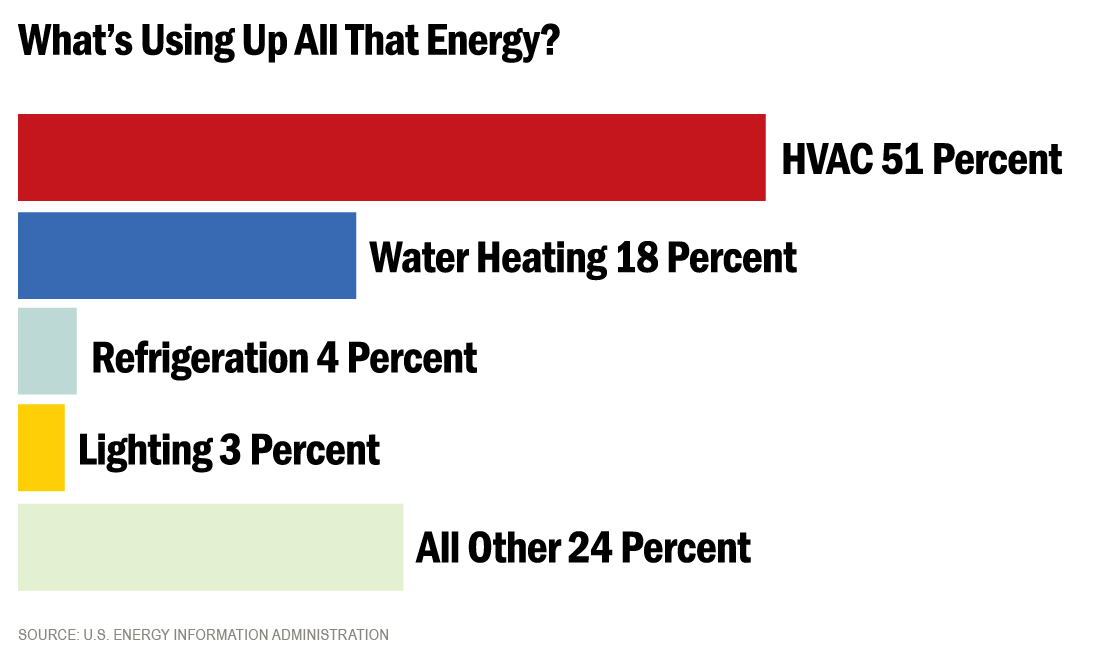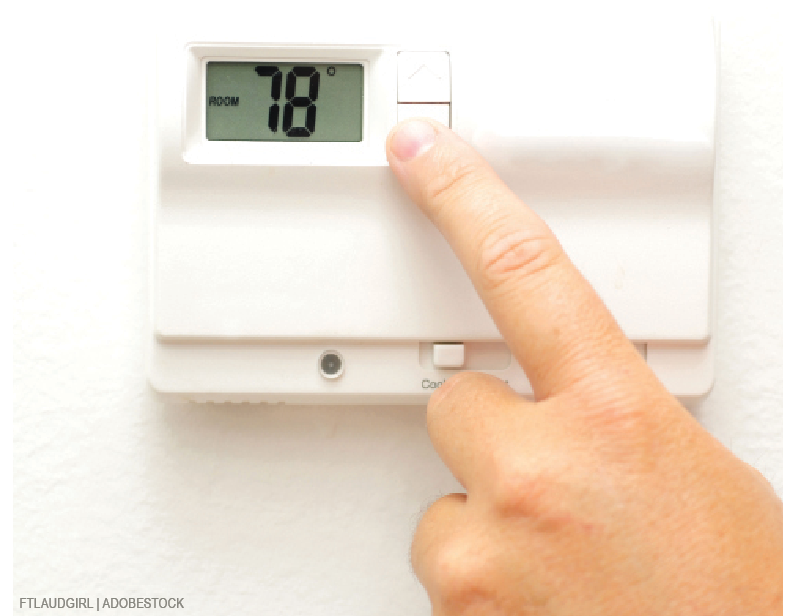What drives high bills? Usage. Learn how and what is using all that energy and
take some of the guesswork and headache out of energy costs.
by
ERIC COMPTON
Possibly the most common question posed to United’s Energy Solutions Team is “How could my home use this much energy?”
While it’s difficult for us, as individuals, to minimize the impacts inflation has had on everyone, we do have the power to manage our energy costs through conservation and efficiency.
The ability to reduce energy consumption in a home can not only save money on bills, but can also help to reduce demand on the electric grid. In general, electric rates and demand experience a positive correlation. United’s Member Services and Energy Solutions teams assist members daily to understand their power consumption and ultimately help lower their usage. So, what exactly is consuming all these kilowatt-hours (kWh)?
The three main divisions of power consumption in a home include air conditioning and heating systems (HVAC), water heating and lighting, refrigeration and all other items. These divisions contribute to a home’s energy consumption profile with the average residence using 51 percent to power air conditioning and heat, 18 percent for water heating and 31 percent for all other items per a 2020 survey conducted by the U.S. Energy Information Administration.

Air Conditioning and Heating
When breaking down a monthly bill, HVAC makes up more than half the energy consumption for most members’ homes. Due to temperature extremes, most bills trend higher in the winter and summer months, with February and August typically being the highest usage months.
Homes with alternative heating sources such as natural gas, propane or wood usually will have lower consumption in the winter. These homes generally experience their highest consumption in the summer months instead. Central heat and air usage varies amongst members due to a variety of equipment size, brands, efficiency ratings and thermostat settings. The run time of an HVAC system is a significant factor for lowering usage. Home weatherization, insulation, and sealing air infiltration areas are just a few energy-efficient measures that can assist in reducing HVAC run time year-round.
Heating consumption tends to be higher in homes due to the inefficiency that electric resistance heat presents. A heat pump is the most energy-efficient form of electrical heating in a home. Traditional electric resistance heat uses 3-5 times more energy than a heat pump. Keeping HVAC systems tuned up every year by a professional HVAC technician can ensure the heat pump is working properly and not unnecessarily calling on the emergency heat or auxiliary heat.
Temperature settings also are crucial in lowering system run times. The U.S. Department of Energy suggests thermostat settings be set to 68 degrees in the winter and 78 degrees in the summer. Adjusting the thermostat just one degree lower in the summer or one degree higher in the winter can cause an approximate 3-5 percent increase in a monthly bill.
Water Heating
Water heating is typically another large consumer in a home, accounting for an average of 18 percent of most bills. Most tank-style water heaters use about 4500 watts or 4.5 kW when running. To put that into perspective, if a leak caused a water heater to run continuously, it could consume about 108 kWh a day or about 3240 kWh in a month. There are a few energy-efficient ideas that can help lower water heating usage. Keep water heaters set to 125 degrees or lower, wash clothes in cold water, and insulate the water heater and pipes to consume less hot water. Consider changing a water heater to a more energy-efficient model that can also conserve precious energy dollars. The Department of Energy states that heat pump water heaters can be 2-4 times more energy efficient than a conventional electric water heater. United also offers a $150 rebate for a new heat pump water heater installation.
Refrigeration/Lighting/All Other
HVAC and water heating consume about 69 percent of a home’s usage, leaving the remaining 30 percent for everyday items in the home, including refrigeration and lighting. Looking around the home, there are multiple items that must be plugged in to operate. Most of these items in a home, such as a TV, do not require a lot of power individually to run. An average LED TV uses between 80 and 120 watts, or .08 to .12 kW per hour. You would have to leave this TV on for nine hours to consume just 1 kWh, which would equate to approximately 14 cents.
Lighting has made many efficiency advancements over the last few years with the LED bulb leading the way. LED lighting is very energy efficient compared to older incandescent lighting. A traditional 65-watt incandescent bulb can now be replaced with a 5-watt LED bulb, saving 60 watts per bulb.
In addition to this, most appliances purchased within the last 10 years have increased in energy efficiency. Many appliances purchased include an Energy Star rating meeting strict energy-efficient criteria established by the U.S. Environmental Protection Agency. United Cooperative Services offers an energy usage pamphlet listing many of the common electrical items and the energy required to power them. This pamphlet provides perspective into a home’s energy consumption. The “Please tell me how I could use that much electricity” pamphlet is located at all UCS offices. This resource is also handed out during our free in-home energy audits.
What Can Members Do?

Personal electrical usage habits, and the habits of those in the household, make a huge difference in an electric bill. Although there are factors that cannot be controlled, such as exterior temperatures, there are many factors that can be managed.
-
Adjust thermostats when away from home. Many Wi-Fi thermostats offer an option for this to happen automatically.
-
Keep thermostats set to recommended temperatures of 68 degrees in the winter and 78 degrees in the summer.
-
Get an HVAC tune-up and change filters regularly.
-
Purchase appliances with a high energy efficiency. Look for an appliance that is ENERGY STAR rated.
-
Reduce your electrical load by turning off lights, electronics, and other electrical equipment when not in use.
-
Perform any repairs on air infiltration areas such as sealing around windows, doors, and ductwork.
United strives to be your trusted energy advisor. Energy experts on staff provide free energy audits for both residential and commercial/industrial members seeking energy efficiency advice. One of the best ways to discover where usage is coming from is to sign up for a free energy audit. Visit our website at www.ucs.net or call your local office today and contact our Energy Solutions team. United will provide a comprehensive evaluation of your home for FREE.




